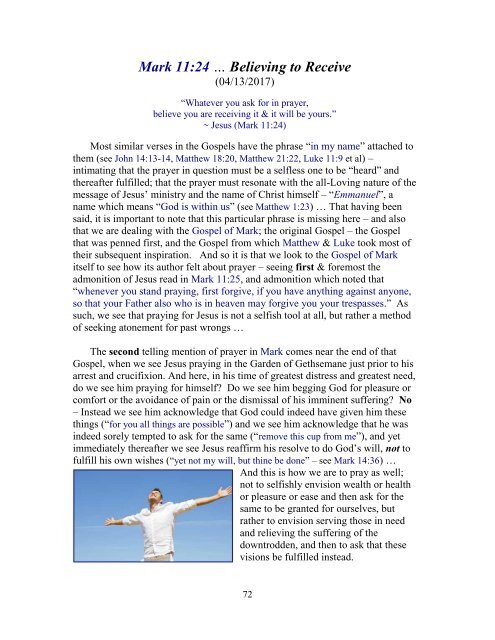My Favorite Verses - Vol V (Feb 17 to Jun 17)
An illustrated collection of brief commentaries on some of the Bible’s most beloved (and some of its least understood) passages, parables, verses & sayings
An illustrated collection of brief commentaries on some of the Bible’s most beloved (and some of its least understood) passages, parables, verses & sayings
You also want an ePaper? Increase the reach of your titles
YUMPU automatically turns print PDFs into web optimized ePapers that Google loves.
Mark 11:24 … Believing <strong>to</strong> Receive<br />
(04/13/20<strong>17</strong>)<br />
“Whatever you ask for in prayer,<br />
believe you are receiving it & it will be yours.”<br />
~ Jesus (Mark 11:24)<br />
Most similar verses in the Gospels have the phrase “in my name” attached <strong>to</strong><br />
them (see John 14:13-14, Matthew 18:20, Matthew 21:22, Luke 11:9 et al) –<br />
intimating that the prayer in question must be a selfless one <strong>to</strong> be “heard” and<br />
thereafter fulfilled; that the prayer must resonate with the all-Loving nature of the<br />
message of Jesus‟ ministry and the name of Christ himself – “Emmanuel”, a<br />
name which means “God is within us” (see Matthew 1:23) … That having been<br />
said, it is important <strong>to</strong> note that this particular phrase is missing here – and also<br />
that we are dealing with the Gospel of Mark; the original Gospel – the Gospel<br />
that was penned first, and the Gospel from which Matthew & Luke <strong>to</strong>ok most of<br />
their subsequent inspiration. And so it is that we look <strong>to</strong> the Gospel of Mark<br />
itself <strong>to</strong> see how its author felt about prayer – seeing first & foremost the<br />
admonition of Jesus read in Mark 11:25, and admonition which noted that<br />
“whenever you stand praying, first forgive, if you have anything against anyone,<br />
so that your Father also who is in heaven may forgive you your trespasses.” As<br />
such, we see that praying for Jesus is not a selfish <strong>to</strong>ol at all, but rather a method<br />
of seeking a<strong>to</strong>nement for past wrongs …<br />
The second telling mention of prayer in Mark comes near the end of that<br />
Gospel, when we see Jesus praying in the Garden of Gethsemane just prior <strong>to</strong> his<br />
arrest and crucifixion. And here, in his time of greatest distress and greatest need,<br />
do we see him praying for himself? Do we see him begging God for pleasure or<br />
comfort or the avoidance of pain or the dismissal of his imminent suffering? No<br />
– Instead we see him acknowledge that God could indeed have given him these<br />
things (“for you all things are possible”) and we see him acknowledge that he was<br />
indeed sorely tempted <strong>to</strong> ask for the same (“remove this cup from me”), and yet<br />
immediately thereafter we see Jesus reaffirm his resolve <strong>to</strong> do God‟s will, not <strong>to</strong><br />
fulfill his own wishes (“yet not my will, but thine be done” – see Mark 14:36) …<br />
And this is how we are <strong>to</strong> pray as well;<br />
not <strong>to</strong> selfishly envision wealth or health<br />
or pleasure or ease and then ask for the<br />
same <strong>to</strong> be granted for ourselves, but<br />
rather <strong>to</strong> envision serving those in need<br />
and relieving the suffering of the<br />
downtrodden, and then <strong>to</strong> ask that these<br />
visions be fulfilled instead.<br />
72


















